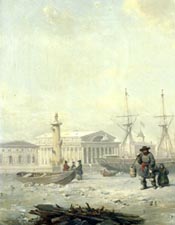The Bronze Horseman
, translated by Kline, A. S. (contact-email)
The Bronze Horseman is a significant narrative poem by Alexander Pushkin, written in 1833 about Saint Petersburg’s founding and the catastrophic flood of 1824. Despite completion in 1833, it remained unpublished in its final form until after Pushkin’s death due to censorship. The work is structured into an introduction and two main parts, employing four-foot iambic meter throughout, and features a blend of solemn and playful tones.
The poem opens with a mythic account of Peter the Great founding the city in 1703, envisaged as Russia’s gateway to Europe. Pushkin venerates Saint Petersburg, applauding its architectural grandeur and seasonal extremes. In the narrative, a destitute Evgenii dreams of a future with his love, Parasha, before a flood ravages the city, destroying Parasha’s home and driving him to madness. After a year, a vengeful Evgenii curses the statue of Peter the Great, which animates and pursues him, culminating in Evgenii’s death. The details of the flood (1824) are taken from contemporary records. The curious may refer to the account (1826) given by Vasily Nikolayevitch Berkh, geographer and historian.

Kline, A. S.
Support Open-Access:
Your contribution keeps our classical translations available to all. Every dollar helps support classics education and funds the expansion of our catalogue. Value what we do? Donate now.
File Downloads:
© Copyright, All Rights Reserved. This work may be freely reproduced, stored and transmitted, electronically or otherwise, for any non-commercial purpose. Conditions and Exceptions apply.